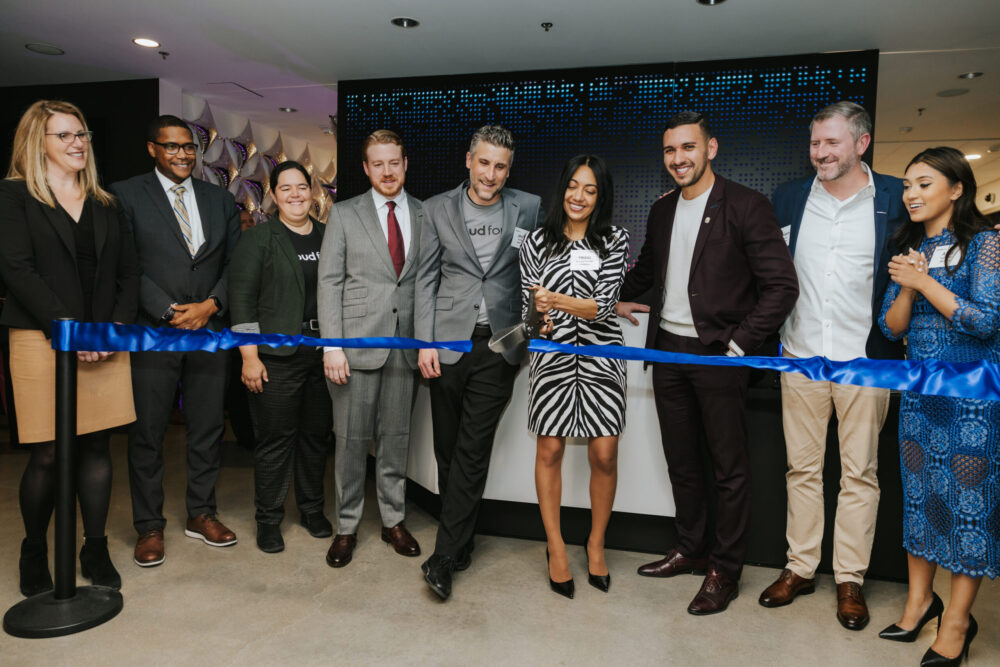
By James Matheson
Prince George’s County has long been considered the poor step-sibling of the Washington area’s more affluent and business-savvy counties.
But that image is starting to change as the county becomes an increasingly attractive location for new companies, including many that are developing innovative products and services.
Business leaders say the county is seeing growth in many types of companies, including high technology, cybersecurity and bio-health firms.
Some of the new firms are offspring of business incubators and entrepreneurial support centers at the University of Maryland, Bowie State University and NASA’s Goddard Space Flight Center, according to the Prince George’s County Economic Development Corp.
Prince George’s, which has a large minority population, is also seeing a spurt in the number of African American and Latino owned business, which range from government contractors and business service providers to small mom-and-pop retail companies.
Jennifer Rios, president of the Hispanic Chamber of Commerce of Prince George’s County, described what she called a “surge” in new businesses in the past few years, including many owned by Latino immigrants.
A study by the American Immigration Council found that immigrants in the county are 30 percent more likely to start a business when compared to other county residents. Latinos, said Rios, are guided by a desire “to build generational wealth that they can pass along to their children.”
Rios herself owns two businesses, including VARIDD, a commercial landscaping and construction company established in 2022 that has contracts with the Department of Veteran Affairs and the National Cemetery Administration.
Data from the U.S. Census Bureau seems to confirm Rios’ observations.
The data shows that in Prince George’s, the second most populous county in Maryland, business formations have been rising at a rapid clip for nearly a decade, when they started to surpass the number of formations in Montgomery County, the most populous county in the state.
In 2022, according to Census data, there were 22,452 business formations in Prince George’s, more than double the number in 2012. In Montgomery, business formations totaled 16,471 in 2022, a 48% increase from 10 years earlier. (The Census Bureau will release business formations statistics for 2023 this summer.)
The government tracks a business formation when an application is filed for an employment identification number, or EIN. It’s not a perfect measure: Not every entity that requests an EIN actually forms a business or hires employees. But economists can watch the data for patterns to discern changes.
The trends clearly show positive developments for Prince George’s County.
Although Prince George’s has long been home to some high-level research centers and federal government agencies, it also has many low-income communities and higher rates of crime than neighboring counties. The county has pockets with high rates of poverty, but also affluent communities.
Prince George’s median average household income was about $98,000 in 2022, according to the Census Bureau. That was higher than the national average of $75,000 but lower than the neighboring counties of Montgomery at $126,000; Fairfax, Virginia, at $129,000 and Washington, D.C., at $102,000.
Not only is the county seeing growth in startups, it’s welcoming agencies and companies relocating from Washington, D.C., and neighboring counties in Maryland and Virginia.
Most notably, the federal government announced late last year that the FBI’s long-awaited new headquarters will be built in Prince George’s, a major win for the county which beat out bids from Virginia. The FBI is expected to be a draw for a new crop of cybersecurity companies.
The county is already home to several new security firms, including Wave Welcome, which was founded in 2020 by Vennard Wright.
Prior to starting Wave Welcome, Wright held a number of senior technology positions for organizations and was the director of technology for Hillary Clinton’s re-election campaign for U.S. senator from New York in 2006 and for her unsuccessful presidential run in 2008.
Wright started Wave Welcome to provide technology and cybersecurity services to smaller and mid-sized companies, nonprofit organizations and universities.
Such establishments “typically don’t have access to high-level technology expertise, because they can’t afford it,” Wright said. “We make it so that they have access to the technologies and cybersecurity best practices to keep them secure from data breaches and ransomware attacks.”
In May 2023, Wright and his wife Janelle started a second company called PerVista, which uses artificial intelligence to analyze video streams in an effort to spot and prevent gun violence.
Wright, who is African American and a Prince George’s County native, said he was motivated to start his company to “leverage technology to build wealth for minority communities.”
David Iannucci, president and CEO of Prince George’s County Economic Development Corp., said the growth in new technology businesses isn’t an accident.
“Going back more than 10 years, we analyzed the county’s retention rate for these companies and saw room for improvement,” he said.
The development corporation started to provide greater support to startups and small businesses, such as providing information about funding and hosting workshops and networking events.
Some already-existing tech companies are relocating to Prince George’s as well, in part to take advantage of lower real estate costs but also to be an early arrival in what some believe will be a new tech hub and to take advantage of services provided by economic development agencies.
“I originally started my company in Northern Virginia, and I realized there’s a million other little companies just like mine that are vying for the same resources and vying for attention,” said Husein Sharaf, 36, the founder and chief executive of Cloudforce. The computer consulting firm specializes in the Microsoft cloud operating system, primarily for Fortune 500 companies.
Sharaf founded Cloudforce in 2010 as a one-man operation before moving its homebase to Prince George’s in 2014.
“It’s just less crowded,” Sharaf said. “Which ultimately means there’s more (funding) per business that’s eligible … there’s more attention here if you know how to network.”
The Washington Business Journal named Cloudforce one of the region’s best companies to work for three consecutive years.
The company has 65 full-time employees working from offices at National Harbor, the large business and entertainment complex on the Potomac River just south of the District of Columbia border.
Sharaf estimates that he’s paying 25% to 30% less for office space in Prince George’s when compared to other nearby locations.
“Finding similar space in Northern Virginia or D.C. that’s Class-A waterfront and as nice as National Harbor is going to be obviously much more expensive,” he added.
Sharaf is hoping that as the number of technology businesses in the county grows, the image of the county will improve, encouraging more funders and venture capitalists to take notice.
“Just having a tech ecosystem in the county is good for us because it makes people actually want to come here and stay here and work here,” Sharaf said. “One of the issues that this county has had historically, is that people don’t really see it as being one of those places. So the more activity that we have that is public, the more I think we start to create a name for this area.”


